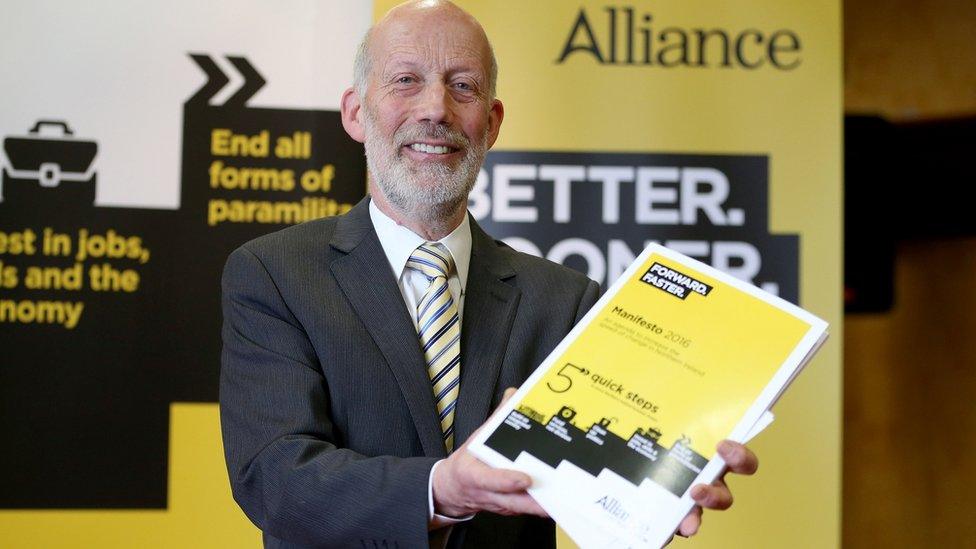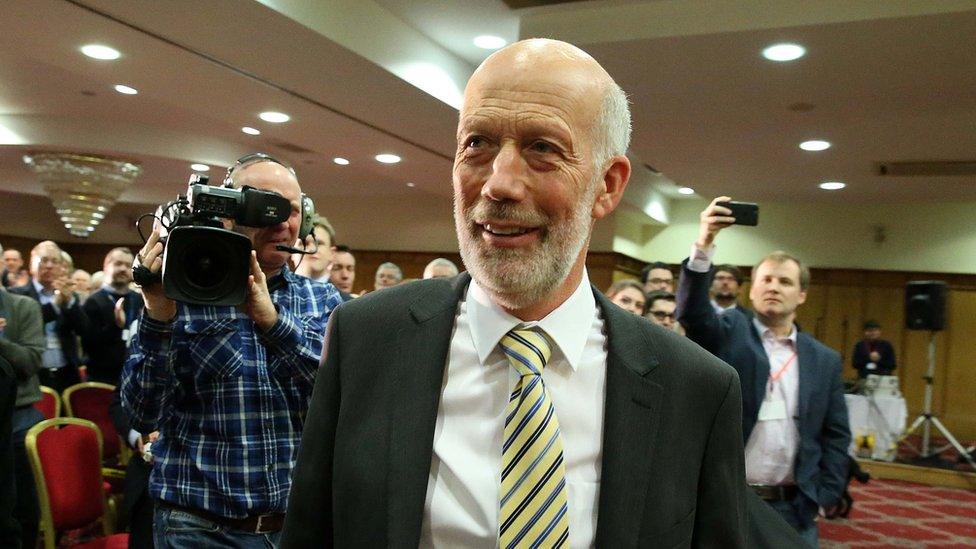David Ford: Former minister stepping down from Stormont
- Published
'It's the right time to leave'
The former Alliance leader David Ford is stepping down from Stormont, 20 years to the day since he became an MLA.
The 67-year-old was first elected as a councillor in Antrim in 1993, before going on to win a seat in the assembly.
He took up his role at Stormont on 1 July 1998, representing the South Antrim constituency.
In 2010 he became justice minister - the first local politician in that role in nearly 40 years.
In an interview with BBC News NI, Mr Ford said the time was right to leave politics.
"I think given now I'm a couple of years past the retirement age, it's the right time to leave to get someone else established while the assembly is not functioning normally so they can be ready to go when the assembly is restored," he said.
'Prisons hit the headlines'
Mr Ford will step down officially at the end of this week, after the party holds a selection process to determine who will replace him in the assembly.
He was chosen to become justice minister in 2010 when policing and justice powers were devolved to Stormont.
He said he was extremely fortunate to have had a good team working with him, despite the complexities of his ministerial brief.
In 2015, he said he would not resign as justice minister after a damning report into Maghaberry Prison in County Antrim, which found it was the most dangerous prison in the UK.
"Prisons hit the headlines most but there was a lot of other work being done - running prisons is never easy," he said.
David Ford has had, at times, a testy relationship with the press
"I believe our prisons are in a much better place than they were, when I've been back in all three prisons in the last few months I see very constructive work being done led by local teams who grew and developed during my time in office and I'm quite proud of that."
Alliance decided against taking the justice position again in the Stormont executive in 2016, and the role was taken on by independent unionist MLA Claire Sugden for less than a year before power-sharing between the DUP and Sinn Féin collapsed.
Several rounds of talks to restore the institutions have since collapsed, the latest attempt was in February 2018.
Proposals included in a draft deal, which were never agreed, included a clause that would have meant that by 2022 the justice minister could have been chosen in the way other executive ministers are elected - meaning the DUP or Sinn Féin could potentially nominate one of their MLAs for the role.
'Maturity'
Mr Ford said he did not believe either of the two parties had shown maturity to demonstrate they could carry out the job.
"I'm not sure if you look at the present situation that the two big parties have shown any maturity at all," he said.
"There were good reasons why in 2010 the justice minister was elected with the confidence of the whole assembly, which inevitably meant an Alliance minister but there was a confidence that we would provide someone who would do a competent, balanced job.
"What we've seen since 2016 was the inability of the two biggest parties to agree."
Mr Ford said he believed he was leaving the Alliance Party, which he led for 15 years, "in good hands" with the party's current leadership, Naomi Long and Stephen Farry.
"The reality is, 20 years ago I was elected as one of a team of six MLAs and now we have eight safe seats out of 90," he added.
"In the early days we were the fifth party in a four-party system, now we're the fifth party in a five-party system.
"I think that shows our growth which has been modest, but not spectacular, is continuing and Alliance is doing well."
- Published6 December 2016

- Published18 October 2016

- Published5 October 2016

- Published25 June 2018
